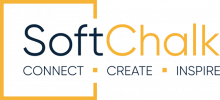Professor Marya Grande wanted to demonstrate to the students in her Special Education Teachers Program how technology can be used to increase student interaction, give a personalized learning experience and meet the needs of different student learning styles. So, using SoftChalk, she created a class assignment that would do just that.
Dr. Grande, an associate professor at Canisius College, teaches a 6-credit block of two classes: Nature and Needs of Students with Learning Disabilities and Remedial Strategies in the Content Areas. As part of the course, Grande assigned 12 college sophomores the task of creating their own digital storybook on a specific science topic using SoftChalk. A special education teacher from a nearby school provided a list of the science topics that her students would be studying for the rest of the school year and each teacher candidate selected one of these topics for their digital book. Topics included electricity, the solar system, rocks, fossils and the life cycle of a butterfly.
The books were designed for children with learning difficulties that read on a first or second grade level. Once the books were complete, they were posted to a class blog and the teacher began using them in her self-contained special education class.
One of the fundamental aspects of the assignment was for the students to learn about Universal Design for Learning (UDL), a flexible approach to curriculum design and implementation that offers all learners full and equal opportunities to learn. UDL addresses the barriers traditional books often pose for students with exceptional learning needs; digital books were offered as a way to reduce these barriers and provide robust support to all learners.
The digital books the candidates created provided visuals, videos and interactive activities to teach the science content. Features of the digital storybook also allowed scrolling over highlighted words for definitions, interactive pictures, sidebars and hyperlinks to access more information, as well as, quizzes to test knowledge and comprehension for assessment. There was also a sound file for each page so that the text on each page could be read to the reader if needed.
Aliyya Christiani, Janelle Kaczor and Elizabeth “Libby” Pszonak, three students enrolled in the Special Education Teachers Program, created digital books as part of the assignment and were invited to participate in the Canisius College Ignatian Scholarship Day. They presented their books and demonstrated the accessibility features and advantages of using such books created with SoftChalk.
After completion of the assignment, Dr. Grande surveyed her students on their experience of creating a digital book. Although some thought the creation process was time consuming, everyone agreed that the books were a great resource and said that they would use them with their students in the future.
One student in particular started using the digital book idea right way in her field placement at an urban school. Through embedded text poppers and video clips shown in a SoftChalk book/lesson, she was able to easily explain what a rodeo was to students with exceptional learning needs, many of whom were not native English speakers.
Based on the success of this project, Dr. Grande plans to continue to have her students use SoftChalk to make future teachers aware of the importance of universal design for learning and how assistive technology can come in many forms.
Links of interest:
Visit Dr. Grande’s blog to find out more information and see the digital books

Leave a Reply